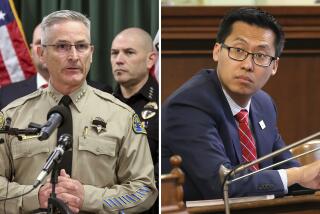Maryland’s other primary may be one to watch
- Share via
Reporting from Washington — As Maryland Republicans weigh in on the GOP presidential race Tuesday, Democrats in the western part of the state will cast ballots in a much hotter congressional primary, one that could be key to the party’s quest to take control of the House of Representatives.
State Democrats marked 85-year-old Republican Rep. Roscoe Bartlett as a potentially vulnerable incumbent when they added large portions of heavily Democratic Montgomery County to the revamped 6th Congressional District, where Bartlett has served for 10 terms.
Now, Democratic voters will decide which of five candidates should take Bartlett on in the general election – if, that is, Bartlett succeeds in fending off a half-dozen challengers in the Republican primary.
Of the five candidates on the Democratic ballot, two appear to have a chance to win the nomination: state Sen. Rob Garagiola and businessman John Delaney.
Garagiola seemed the obvious choice at first, given his many years of experience in Maryland politics. Since he was elected to the state Senate in 2002, Garagiola has quickly risen to become a leading Democrat in Annapolis. Some say the district was drawn specifically for him.
But Delaney, a wealthy businessman, has gained traction in no small part because of his willingness to sink his personal fortune into the race. By mid-March, he had spent more than $1.6 million --more than three times the amount spent by the rest of the candidates combined. In addition to having personally loaned at least $1.25 million to his campaign, Delaney has also far outraised the rest of the Democratic field.
An early February poll found Garagiola and Delaney tied with 21% support, according to the Cook Political Report.
Other candidates on the ballot include Charles Bailey, a veteran and assistant public defender; Ron Little, an anti-trust attorney; and Milad Pooran, a doctor who recently returned from a tour of duty in Iraq.
As for the incumbent, redistricting has made life far more difficult. Bartlett used to cruise to easy re-elections in this district, where in the past Republicans outnumbered Democrats 47% to 36%.
Now, those figures have been reversed with Democrats outnumbering Republicans 47% to 36%, according to data from the State Board of Elections. Fifty-seven percent of the voters in the district backed Barack Obama in 2008.
Bartlett believes he is “the best and only Republican that can win this seat in November,” and he’s probably right. A Republican without his longtime ties to the district could have a hard time getting his message out to crucial independent voters.
Despite the imbalance caused by redistricting, it is possible for a Republican to win the seat: Voters in this newly drawn district have supported the Republican candidate in the past two gubernatorial elections, albeit by razor-thin margins.
Still, Democrats see Bartlett as one of the most vulnerable Republican candidates in 2012. Citing a poll by the Democratic firm Public Policy Polling, the Democrats’ House Majority PAC said earlier this year that just 39% of voters in Bartlett’s new district approve of him. Voters were divided over whether they would support Bartlett or a Democratic alternative in the general election, according to the “super PAC,” which did not release the full survey results.
Bartlett, despite rumors last year that he might be ready for retirement, isn’t going down without a fight. He has joined the National Republican Congressional Committee’s Patriot Program, which provides campaign guidance and fundraising help to vulnerable incumbents who agree to follow a campaign plan.
Speaking on a debate stage last month, Bartlett reminded voters that he has contributed hundreds of thousands of dollars “from my congressional salary” to local scholarship funds. He rebuffed “accusations” contained in mailers circulated by rival campaigns “that I’m a liberal.”
“I have the same scores from the American Conservative Union that Michele Bachmann has,” Bartlett said, invoking the Minnesota congresswoman whose reputation as a conservative firebrand propelled her -- briefly -- into the presidential race last year.
That argument is unlikely to help Bartlett in the general election, when he’ll have to appeal to independent voters in the Democratic suburbs of Washington, D.C.
Still, none of the other Republican candidates seems better positioned to win in the fall.
State Del. Kathy Afzali and state Sen. David Brinkley had been considered potentially viable challengers, but both have failed to raise much money.
kim.geiger@latimes.com
Original source: Maryland’s other primary may be one to watch
More to Read
Get the L.A. Times Politics newsletter
Deeply reported insights into legislation, politics and policy from Sacramento, Washington and beyond. In your inbox twice per week.
You may occasionally receive promotional content from the Los Angeles Times.










